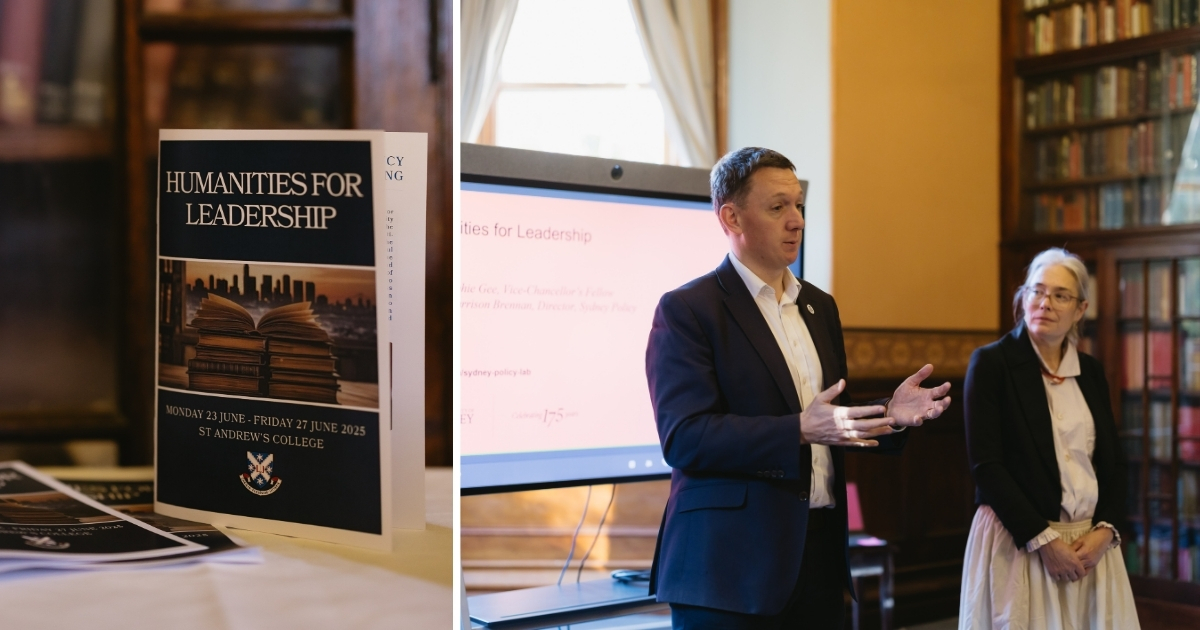Thinking Slowly: Humanities for Leadership at St Andrew’s College
Caitlin Macdonald, Head of Arts at St Andrew’s College, August 2025
In an age of urgency and automation, what does it mean to think well?
At St Andrew’s College, a group of undergraduate students recently took up this question – not through business cases or leadership seminars, but through poetry, paradox, and philosophy. The Humanities for Leadership course, convened by College Principal Dr Daniel Tyler and Associate Professor Sophie Gee, as well as scholars Dr Kate Harrison Brennan, Professor Simon Haines, Professor Peter Anstey, Associate Professor Johanna Harris, and alumnus Craig Blair (Fr 1987) and former College Council Chair Charlie Taylor (Fr 1982, SS 1985), students engaged not in training for management, but in the art of ethical reflection.
This short course explored and practised the capabilities developed in the study of the humanities that are critical for the future of work. Through hands-on workshops led by humanities scholars and industry leaders, students were reminded of the profound value of critical thinking, problem solving, innovation, and creativity – skills fostered in the humanities and increasingly sought after by employers.
They read John Keats on “negative capability” – his phrase for the capacity to remain “in uncertainties, Mysteries, doubts, without any irritable reaching after fact and reason.” In seminar rooms that privilege silence as much as speech, students wrestled with that ambiguity. Not for a grade, not for a job – but as a way of learning how to live with competing truths.
They encountered Pascal’s Wager – not as a religious proposition, but as an ethical experiment. What happens when we must act without certainty? The Wager, they find, isn’t about whether God exists. It’s about how belief and risk shape decision-making. From there, conversations leapt into game theory, climate change, and the moral cost of inaction.
They puzzled over the Ship of Theseus: if every part of something is gradually replaced, is it still the same? The question begins as a thought experiment and quickly turns personal. Can a person change entirely and still be themselves? What about an institution – or a nation?
In each case, the goal is not to arrive at fixed answers, but to practise the habit of thinking through contradiction. Students were encouraged to sit with complexity, to weigh competing goods, and to ask not only “what is true?” but “what is right?”
These are not only academic skills. They are civic virtues.
In a higher education landscape dominated by metrics and outcomes, our Humanities for Leadership course makes a quiet but radical claim: that moral imagination matters. That literature and philosophy are not peripheral to public life, but central to it. That leadership requires more than confidence – it demands judgement.
And judgment cannot be rushed.
Caitlin recently had a thought-provoking piece published in The Conversation, reflecting on the value of humanities education, not only in shaping ethical, critical thinkers, but also in contributing meaningfully to civic life and leadership. You can read her article here: Top Australian writers urge Albanese to abolish Job-Ready Graduates, calling their humanities degrees life-changing
St Andrew’s College offers distinctive, high-quality short courses in a range of subjects to support human capabilities and employability.
Learn more here: Short Courses – St Andrew’s College

